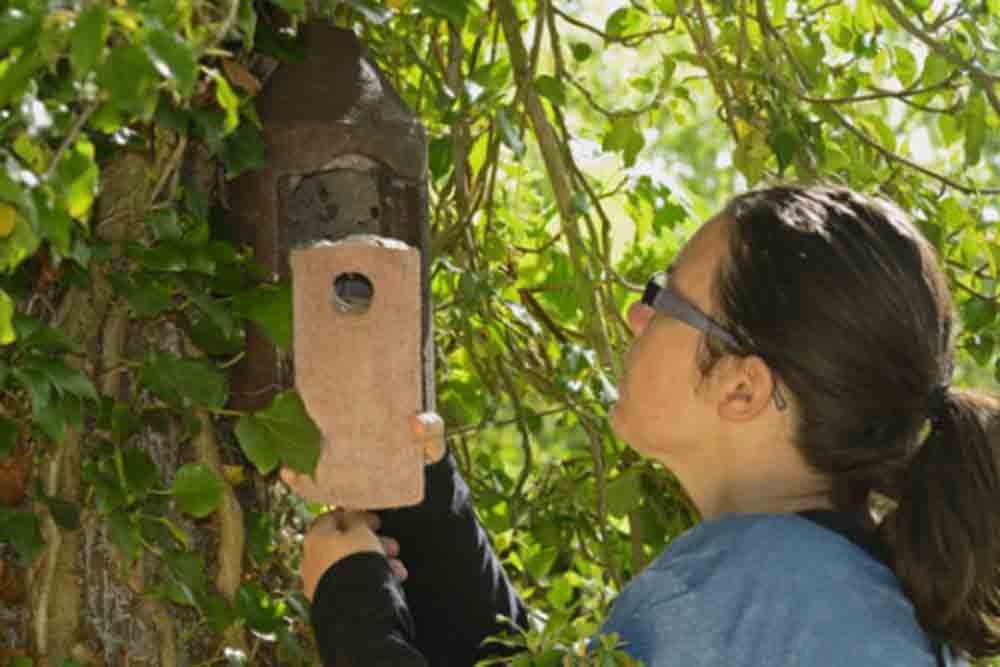Where you put your nest box is every bit as important as what it looks like. The highest priority when siting a nest box must be to provide a safe and comfortable environment in which birds can nest successfully.
Top tips for putting up your nest box

Not too close to another nest box
Nest boxes of the same type should not be sited too close together as this may promote aggressive behaviour between neighbours.
Shelter your box from the weather
The front of the nest box should be angled vertically or slightly downwards to prevent rain from entering the nest box. Make sure it is sheltered from prevailing wind, rain and strong sunlight.
Height from the ground should be about 3 metres
Small-hole boxes are best placed 1-3m above ground on tree trunks, but avoid sites where foliage obscures the entrance hole - a clear flight path is important. If there are no trees in your garden, the next best option is to place your box on the side of a shed or wall. Care must be given to make sure the box isn’t easily accessible to predators.
Open-fronted nest boxes should be hidden from view
Attach your box to a wall or fence that has shrubs and creepers growing against it.
Make sure cats cannot get into the box
Ensure that it is not easily accessible to predators (cats and squirrels).
Consider a metal plate around the hole to deter squirrels
This preventive measure can be used to deter squirrels from gaining access. These plates are available commercially and can be purchased from any good garden centre or bird care company at very little cost.
Keep nest boxes away from bird feeders
High levels of activity of visiting birds could disturb nesting pairs.
Use galvanized or stainless steel screws or nails that will not rust
If fixing boxes to trees, galvanised wire can be used to tie the box to the trunk or hang it from a branch. Make sure to regularly inspect these fittings to ensure the box remains securely attached.
Traditionally, nest boxes for small birds are put up in the spring
Pairs begin to prospect in the latter half of February, so a box put up at the end of the winter stands a good chance of attracting nesting birds. However, it is never too early or late to put up a nest box, as some birds will use them to roost in during the winter months.
Houses for house sparrows
A nest box with a 32mm entrance hole fixed on the wall of a house could well be used by House Sparrows. For Starlings try a box with a 45mm entrance hole.
Nest Boxes: Your Complete Guide
If you would like to know more, try our in-depth book, Nest Boxes: Your Complete Guide. Written by Dave Cromack and drawing on the BTO’s expertise, this new book provides the perfect guide to building, erecting and monitoring nest boxes for a broad range of bird species.
Frequently asked questions about nest boxes
When will I get birds in my nest box?
For many species using nest boxes, such as Blue Tit, Great Tit, House Sparrow and Kestrel, nest building will start in earnest in April, though you may see Blue and Great Tits visiting nest boxes as early as February to choose their mate and nesting location. If you have an open-fronted nest box for Robins, nest building can begin as early as February or March. Our Blue Tit Diary walks through the diary of an average Blue Tit during the breeding season.
Why isn't my nest box being used?
There are many reasons why your box is not being used such as the presence of natural nest cavities nearby and the location of territory boundaries. Therefore, while some boxes may be taken up immediately, others may remain vacant, often for no apparent reason.
If a box is not used for several years in succession it may be worth moving the box to a more suitable location.
Can I look inside my nest box?
Yes, provided you approach quietly and carefully, it is perfectly safe to look into a nest box from time to time to see how things are progressing once the birds are incubating their eggs. Most birds will sit very tight on their nest if you just peek in, though an early morning visit may find the bird off her nest in search of a quick meal before nest duties call her back.
Should I clean out the nest box?
When the breeding season is over, old nests can be removed and the box cleaned out. Bird Protection Law permits the cleaning out of nests between 1 September and 31 January. Any dead eggs must be destroyed promptly and cannot be kept or sold.
Some hole-nesting species, including sparrows, may have second or third broods in the same nest. The nests of these species should be left until sometime during the autumn when it is certain that they are no longer in use.
Can I make or build my own nest box or bird house?
Yes. We've put together a helpful guide to making your own bird next box.
Can I buy a nest box?
We highly recommend our partner, Vine House Farm, for high-quality nest boxes, bird houses, foods, feeders and more.
We also have some advice and guidance on what to look for when purchasing a nest box.